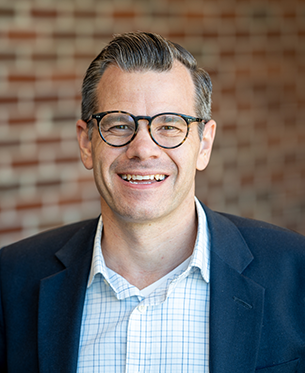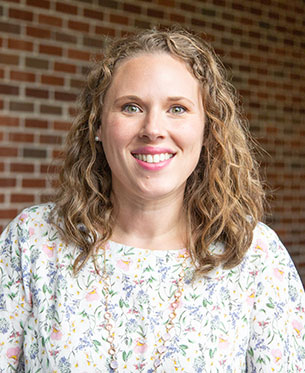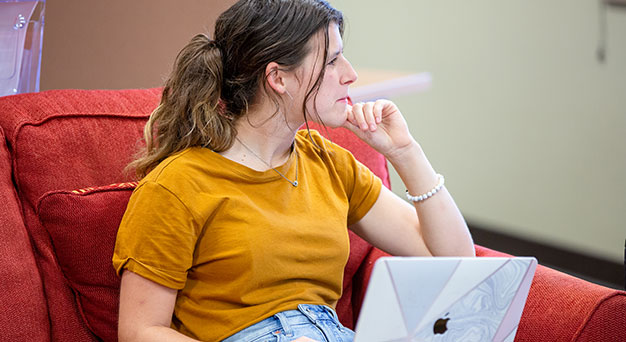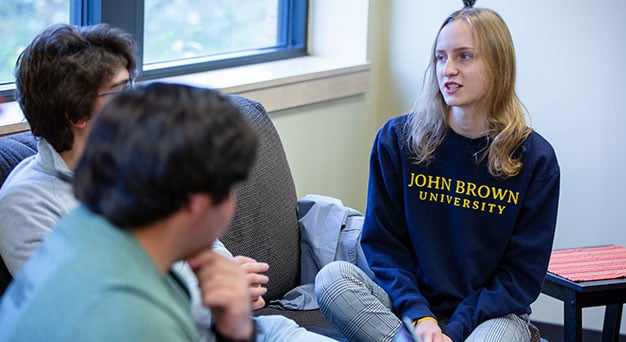- Give
- Alumni and Parents
John Brown University
2000 W. University St., Siloam Springs, AR 72761479-524-9500
jbuinfo@jbu.edu
Enrich your academic experience.
The Honors Scholars Program is designed to enrich and motivate you academically and spiritually in and out of the classroom. Classes are small and interactive, led by faculty who facilitate conversations that encourage you to make deep connections with class content.
be engaged.
What is the Honors Scholars Program?
In the Honors Scholars Program (HSP), you have opportunities to co-teach with a professor, conduct research, take educational trips, study abroad, present your research at regional and national conferences and participate in a community that will encourage you in your academic and professional pursuits.
Our mission
Our mission is to cultivate Christian scholars, serve God's Kingdom, and enrich the broader JBU community.
What we do
HSP is a four-year program that engages students who are passionate about learning. The combined curricular and co-curricular program is specifically designed to extend and enrich academic experiences.
Qualifying students
Students in the Honors Scholars Program generally have a composite ACT score of 28/SAT score of 1320/CLT score of 94, or a high school GPA of 3.8 or higher. We welcome applications from students who may not meet these exact criteria but think the HSP would be a good fit for them.
Foundational and integrated discovery
The JBU Honors Scholars Program is distinctly different from high school honors programs. The program does not rely on a heavier workload, rather smaller class sizes and seminar structures encourage deeper engagement with class subjects and encourage community among students, faculty, and staff. In HSP, students progress through two tiers, in which they choose available curricular and co-curricular options based on individual strengths, gifts and career plans. This intentional approach provides students with individualized paths through their college career and allows students to tailor a cohesive, meaningful learning experience.
Benefits

Honors Center
Open from 7 am to 11 pm weekly and 7 am to midnight on weekends, the Center provides a location for classes, meetings, offices, complimentary coffee, studying, or watching movies. There are couches and chairs for socializing, tables and computer stations for studying and study rooms for private or group study sessions.
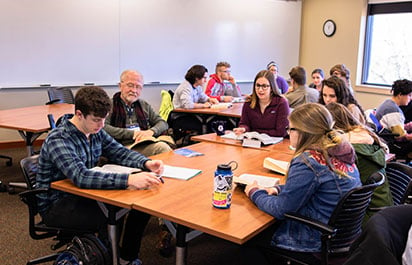
Discussion-based classes
Honors classes are specially designed to challenge and motivate students through critical thinking and analysis. With few exceptions, honors courses count for core curriculum requirements — meaning honors students don’t have to take extra courses to participate in the program.
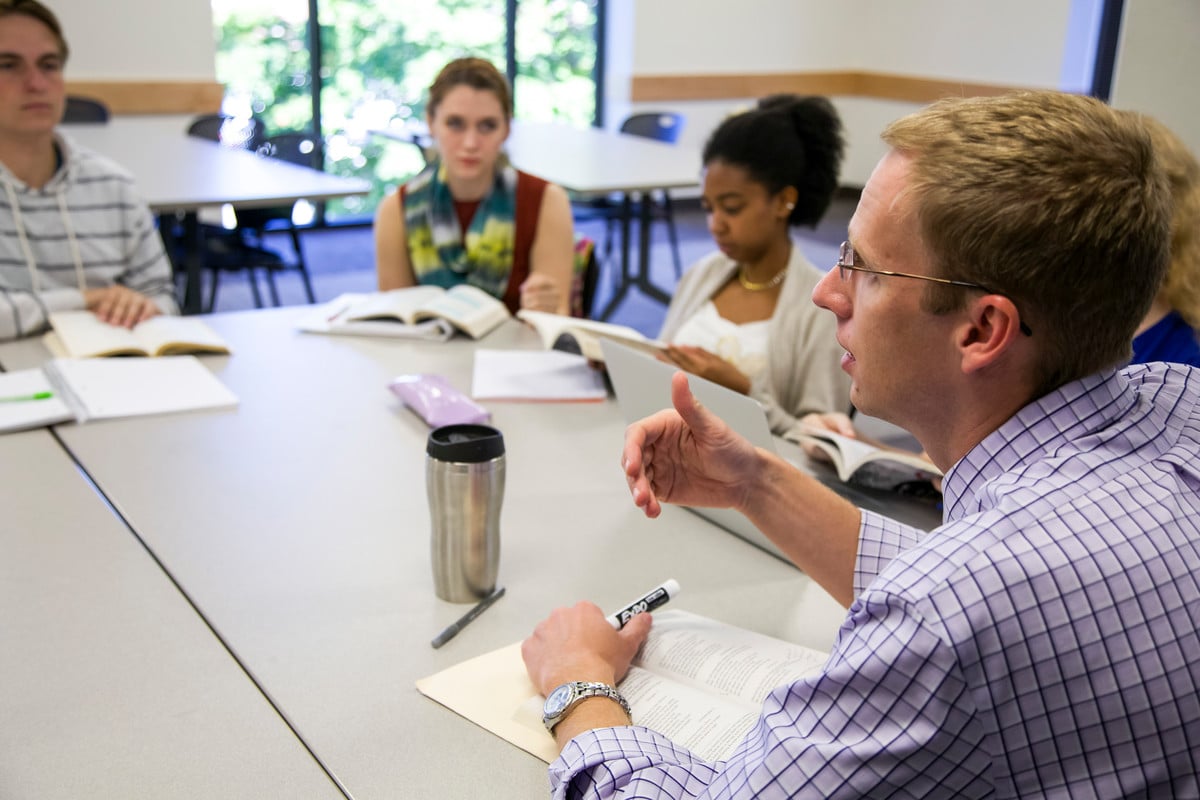
Experiential Colloquia
In addition to the honors core curriculum classes, students may explore ideas, questions, and historical sites through experiential colloquia. Previous colloquia include The Contemplative Tradition at Subiaco Abbey, The Graphic Novels of Gene Luen Yang, and Becoming Evil--Genocide. HSP covers all colloquia expenses for participating students.
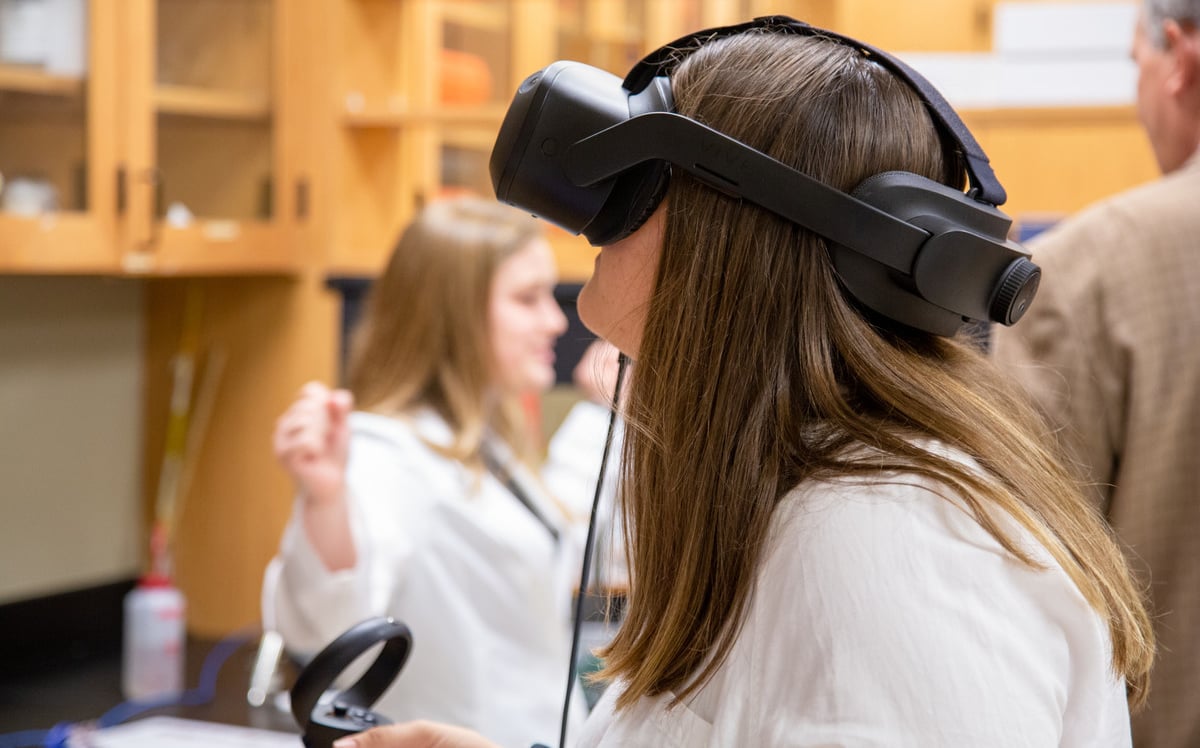
Independent research
During their junior or senior years, many honors students write an original, major-related project based on interests, gifts, passions and goals beyond JBU. A faculty member supervises each student through the selection of the topic, research, writing and completion of the capstone project.
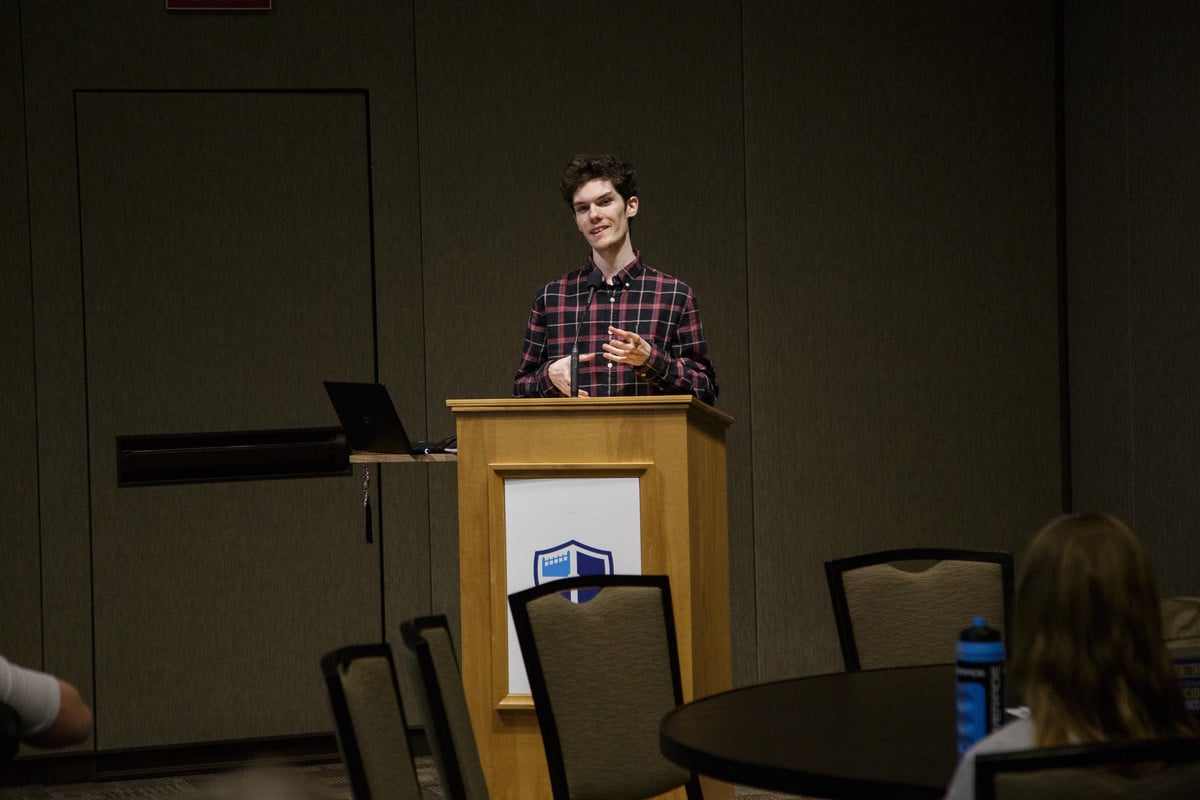
Share your work at conferences
Students may produce papers or creative projects for their lower-division classes, engage in collaborative research in the science lab, or conduct their own independent research via the Honors Capstone Project. Students are encouraged to present their original research or work at national or regional conferences or at discipline-specific conferences. Conference expenses are covered by the HSP in conjunction with academic departments.

Integrated Courses
Honors students may take integrated courses in a variety of academic fields, including Integrated Humanities, Integrated Theology, and Philosophy, Politics, and Economics (PPE). The courses are taught over two semesters, and Integrated Theology and PPE are team-taught.
.jpg)
Co-teach
HSP students have the opportunity to help teach a lower-division class in their major under the supervision of a senior faculty member. This experience offers honors students a behind-the-scenes look at their field of study, introduces them to the pedagogy of their discipline, and provides a rare opportunity of teaching at a university level.

Oxford study abroad
As a part of the Council for Christian Colleges and Universities (CCCU), HSP students may apply for the Scholars' Semester at Oxford (SSO) program, taking one-on-one tutorials with some of the world's most celebrated scholars. HSP students are allowed to apply at least 75 percent or more of JBU-awarded academic scholarships toward their semester at Oxford.
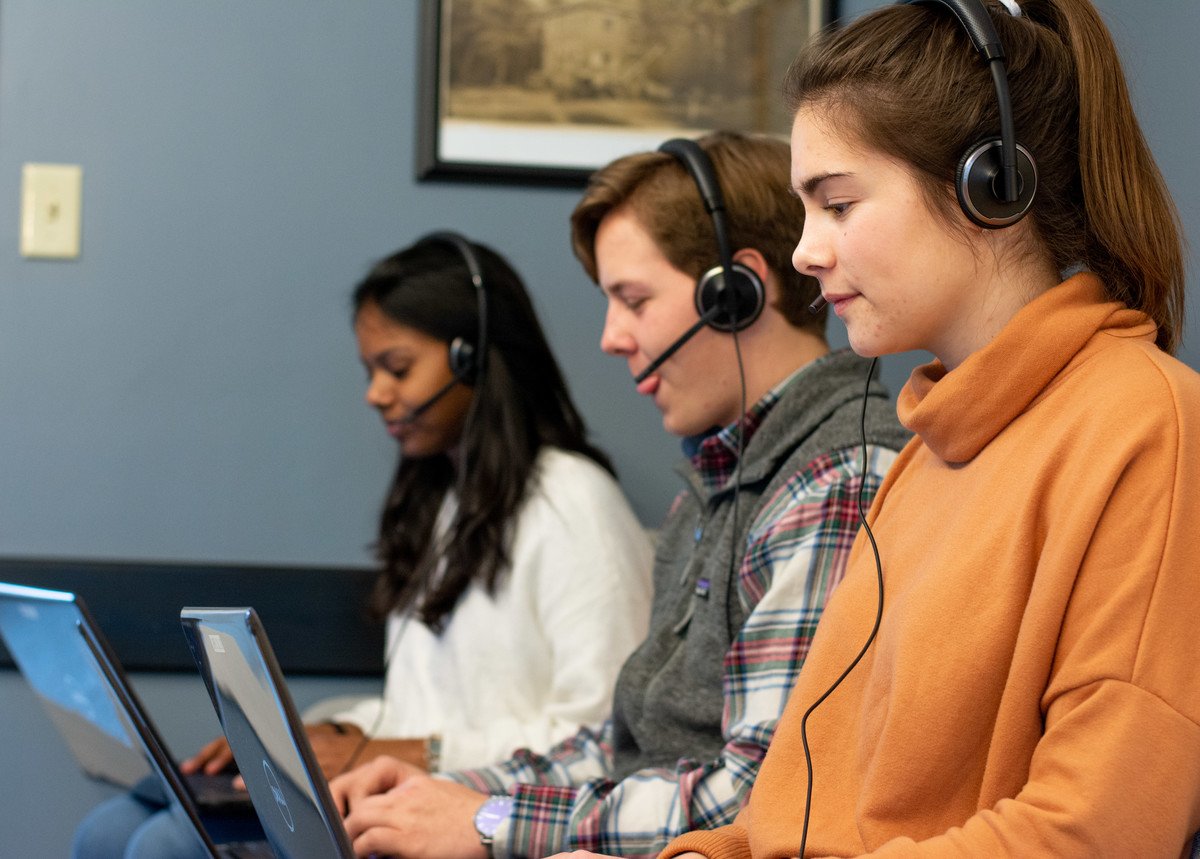
Finding ways to serve
Community engagement is a key component of the Honors Scholars Program’s philosophy, which is why students are encouraged to serve in or create an outreach program for the community.
Lead & mentor: pouring into other students
Executive Council
HSP offers a wide range of opportunities for students to use their unique gifts and to grow both spiritually and intellectually. Many of our students choose to serve as leaders in Honors as Executive Council members and serve as an official voice for honors students. Council members receive honors credit for their participation. These students meet weekly to discuss and develop academic, cultural, and social programming or events.
Associate Executive Council Member
Each Executive Council member may have associates to serve with them throughout the year. The associates help schedule, plan and execute events as needed.
Honors Gateway Mentor
All honors freshmen are required to take an Honors Gateway class. An honors upper-classman serves in each class as a mentor for students. Honors credits are given to honors Gateway mentors.
Other opportunities
Many honors students serve throughout our campus. They are found serving in the Student Government Association, on the Student Ministries Leadership Team, as resident assistants, and in other major leadership positions.
Co-curricular events
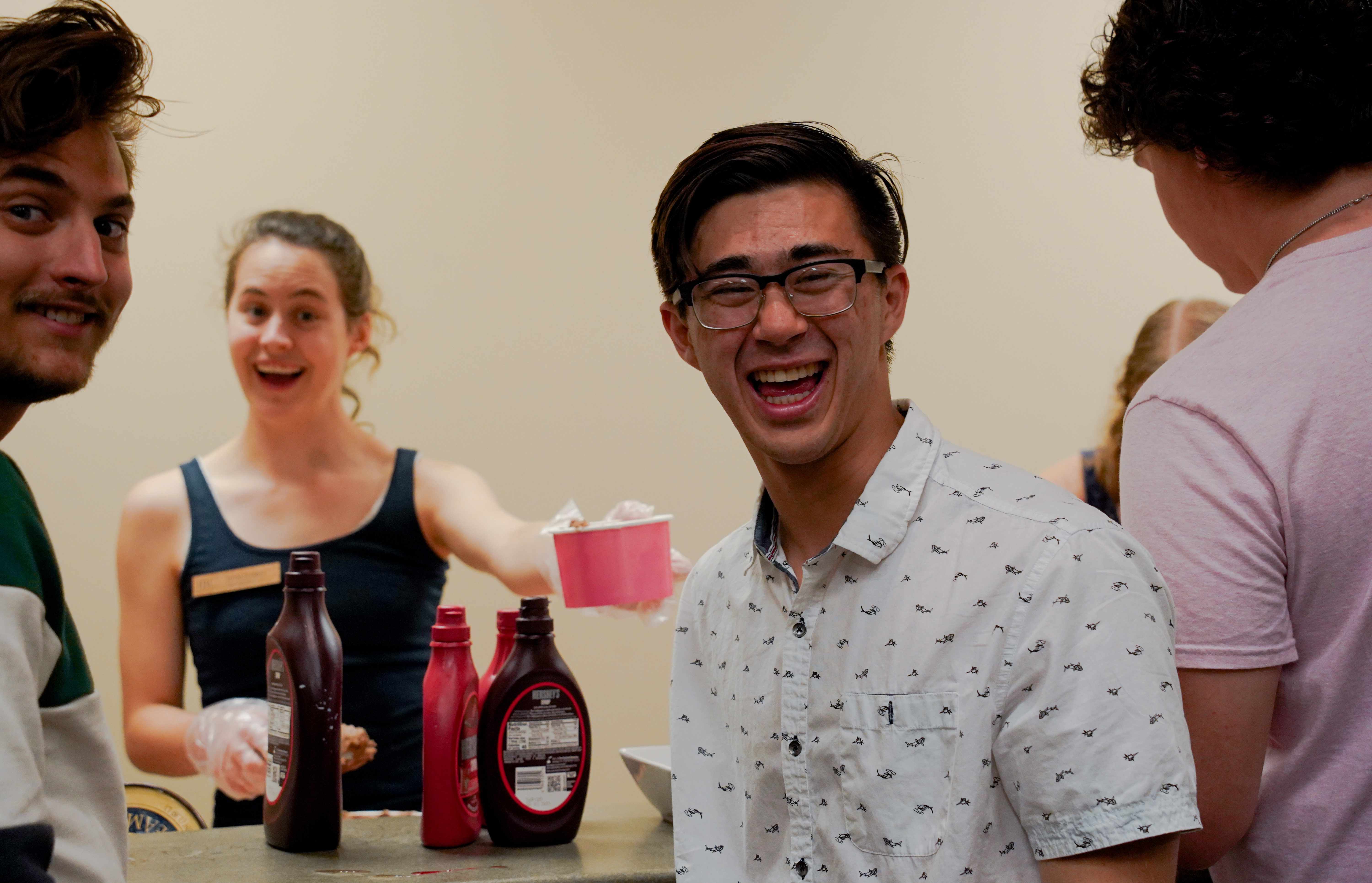
Ice cream social
All honors students are invited to the annual ice cream social after the first day of classes to catch up, play games and eat ice cream sundaes. This is a great time to meet honors faculty and their families.

Sabbath Sunday
Throughout the school year, students are invited to participate in Sabbath Sunday. Commonly hosted in a faculty home, this time is set aside to simply enjoy a Sunday afternoon together. Resting, visiting, playing games, cooking/eating and finger painting have been enjoyed in the past.
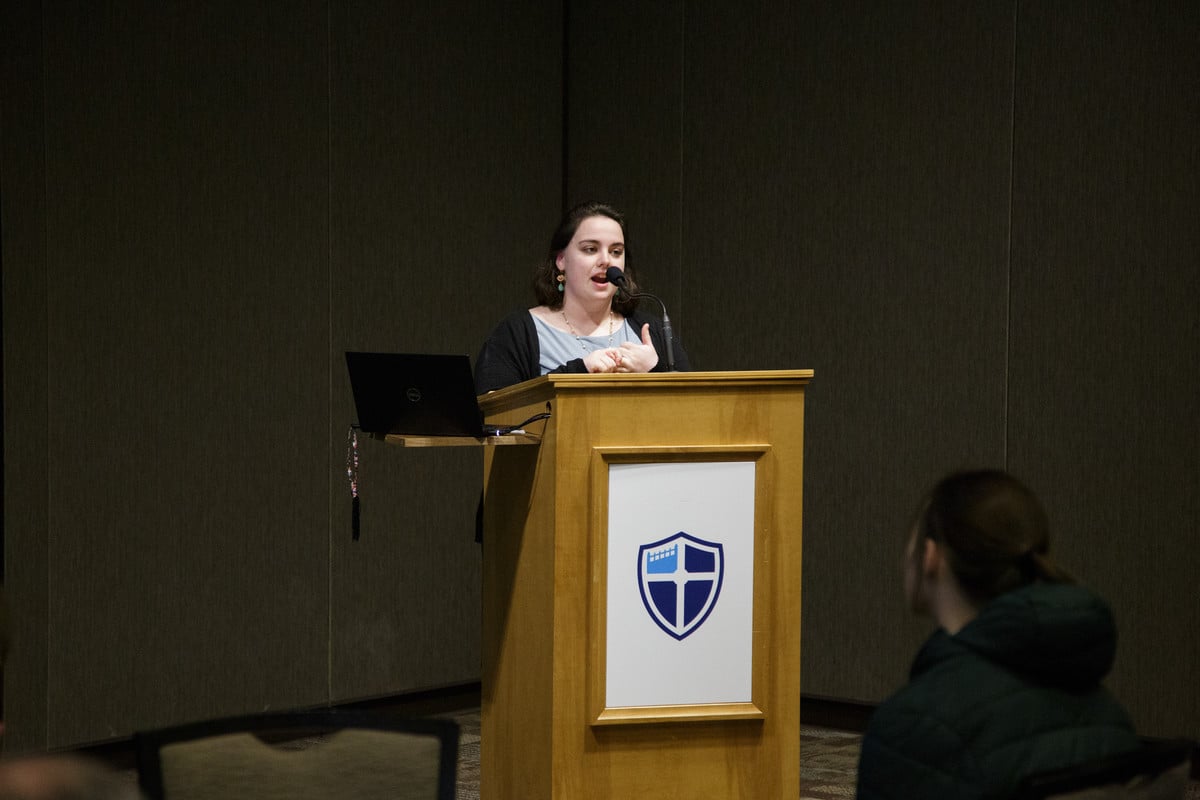
Faith integration presentations
Each semester, upperclassmen present Faith Integration essays formed through their capstone projects. The JBU community and others are invited to hear the presentations during a specific lunchtime.
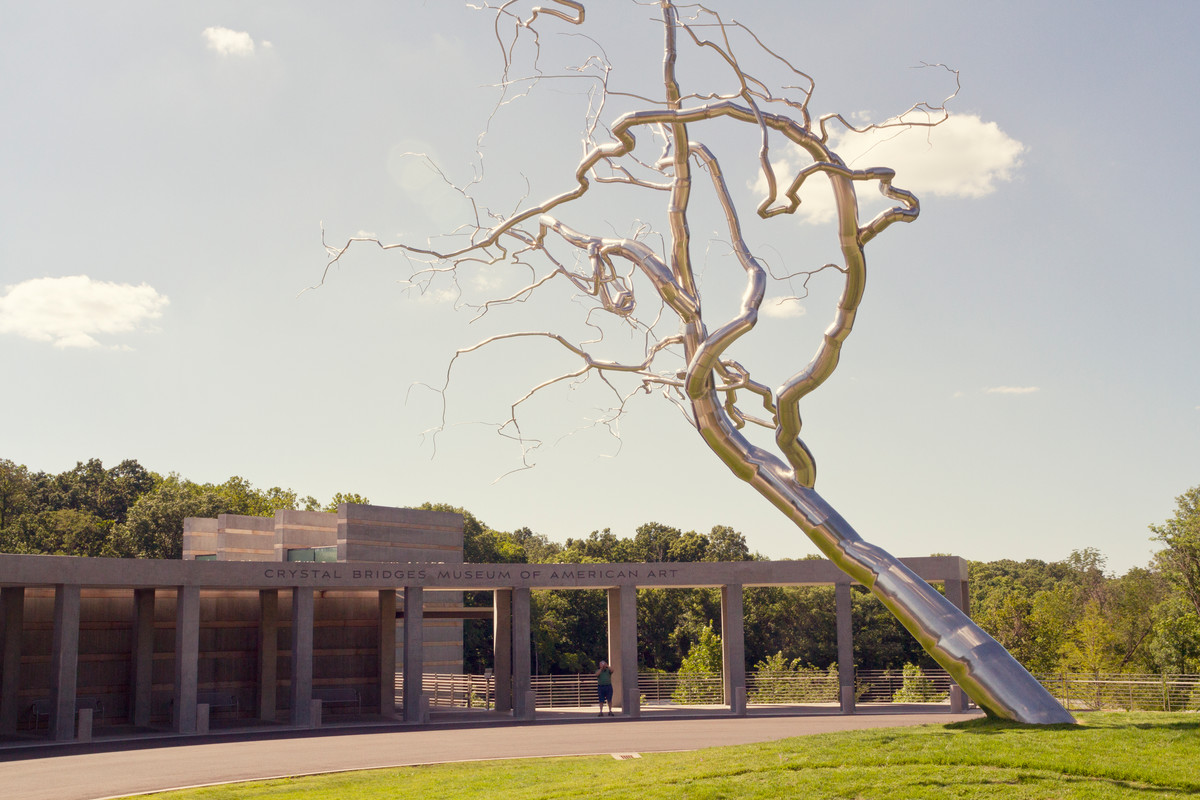
Crystal Bridges Museum of American Art Tour
Honors freshmen travel to Bentonville for a self-guided tour of Crystal Bridges Museum of American Art during the fall semester. Here you will find great masterpieces of art on display for your enjoyment. Travel and entry to the museum are free.
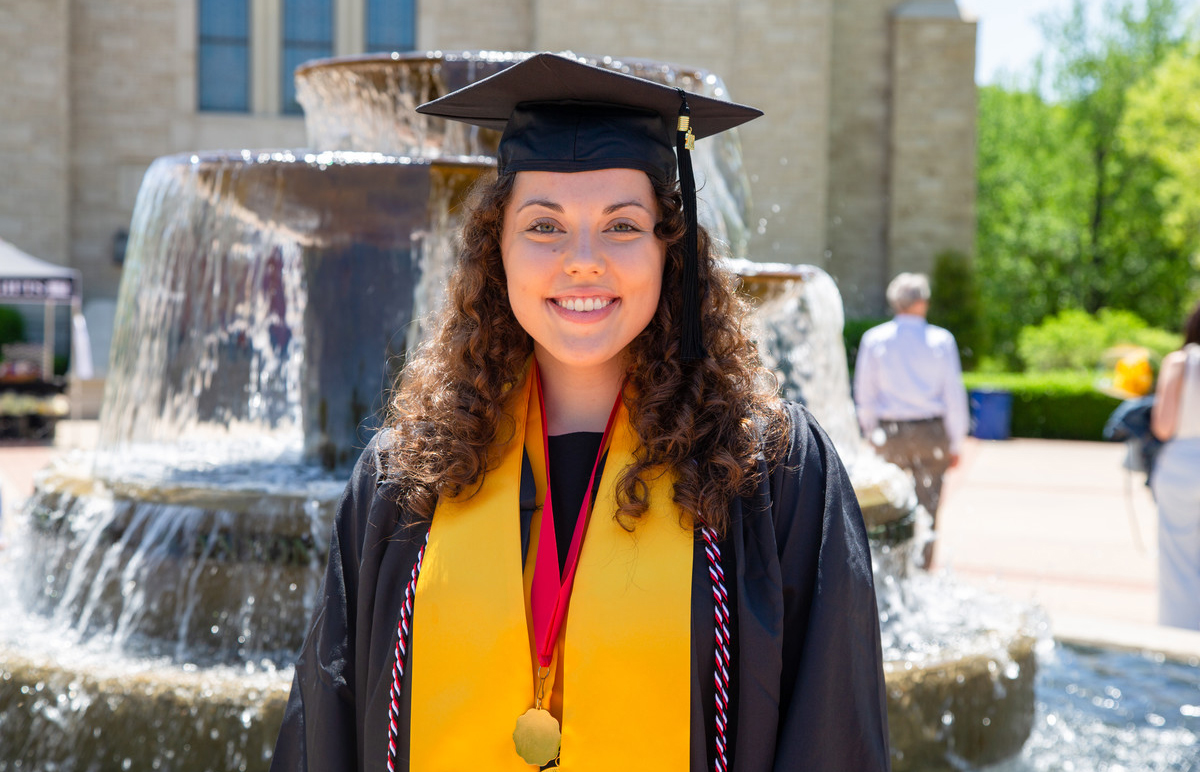
Graduating senior reception
The honors reception held every spring before graduation is a time to recognize and congratulate seniors on their accomplishments. The reception includes an address from the current HSP Executive Council President, the introduction of new executive council members, presentation of honor stoles and formal picture taking of graduates.
Frequently asked questions
Am I smart enough for Honors?
"Sure, I made good grades in high school and got a pretty high score on my standardized test, but I'm not really all that smart. Sometimes I think I just have everyone fooled."'
You would be surprised to find out how many high-caliber students feel the same. In fact, this may be the one common denominator among our very diverse group of honors students. This misperception is so common that it has been dubbed "Imposter Syndrome" by honors programs across the country. Research has shown that smart students are savvy enough to know their own limitations. Thus, honors-caliber students often rank themselves lower on self-evaluations of intelligence. If you join the HSP, you will be surrounded by students who not only share many of your strengths but who also have similar doubts - it is within this kind of community that "iron sharpens iron."
Will the HSP be like my high school G&T program or AP classes?
"I did my high school's Gifted & Talented Program, and I just got burned out trying to make perfect grades and keep up with my AP classes. Is this what the honors program is like?"
Incoming students express concern about the workload that might be required by our program. We totally understand, but we offer something a little different. Our goal is to dig deeper into the subject than in non-honors classes. Thus, you will likely read more primary texts than in AP courses and be asked to develop your own opinions about course concepts and think of ways to apply them to your own life. Our belief is that this deep-learning approach will resonate with high-caliber students who are looking for a fresh start in college.
Will Honors classes hurt my GPA?
"I want to go to medical school, and they're really looking for students with high GPAs. I'm worried that if I take a bunch of honors classes my GPA will suffer."
Honors classes are not designed to be more difficult, rather they are designed to engage students in a different way. Classes are considerably smaller than non-honors classes, and students are asked to think in-depth about ideas or concepts. This means that students most often feel engaged by the class and have to worry less about "busy work," such as rote memorization of long lists. Much of the engagement will come from fellow students — discussion and/or debate with classmates often bring course ideas alive and reveal their significance for Christians living in the 21st Century.
Will Honors classes limit my social life and fun?
"I want to do more in college than take lots of hard classes and spend all my time in the library. Besides, I want to play a varsity sport and maybe be an RA in my sophomore year. Honors would probably get in the way of all this."
The short answer: We seek to encourage students to love the Lord not just with their minds but also with their heart, soul and strength. First, keep in mind that the vast majority of our honors classes meet core requirements. Thus, being in the HSP won't necessarily take any extra time. You will be satisfying JBU requirements as you move through the program. Second, because our goal is to fully develop our students, we actually encourage you to take advantage of the co-curricular opportunities that JBU offers. For example, we celebrate our honors students who play on a varsity team. Many of our honors students also serve as RAs and Enactus, sing in Chorus, play in Chapel Band and are officers in the Student Government Association. These co-curricular experiences combine with our classes to make for a powerful developmental force.
How does Honors apply to my major or career?
"I'm majoring in photography, and I don't think being in honors will help me get a job after I graduate from JBU."
Graduating from the HSP does not guarantee lucrative employment nor automatic admission to the graduate school of your choice. However, we believe that the variety of experiences and opportunities in the HSP will prepare our students to pursue God's calling.
Contact us
Resources
Policy Information
JBU does not unlawfully discriminate based on race, color, national or ethnic origin, sex, age, disability, marital status, military status, or age in the administration of its educational policies, admissions, financial aid, employment, educational programs, or activities.
John Brown University is a leading private Christian university, training students to honor God and serve others since 1919. Arkansas’ top-ranked university (The Wall Street Journal) and top-ranked regional university (U.S. News), JBU enrolls more than 2,200 students from 37 states and 42 countries in its traditional undergraduate, graduate, online and concurrent education programs. JBU offers more than 50 undergraduate majors, with top programs including nursing, psychology, construction management, graphic design, family and human services, and engineering. Eighteen graduate degrees are available in business, counseling, cybersecurity, and education.
Copyright 2025 John Brown University. All rights reserved.
